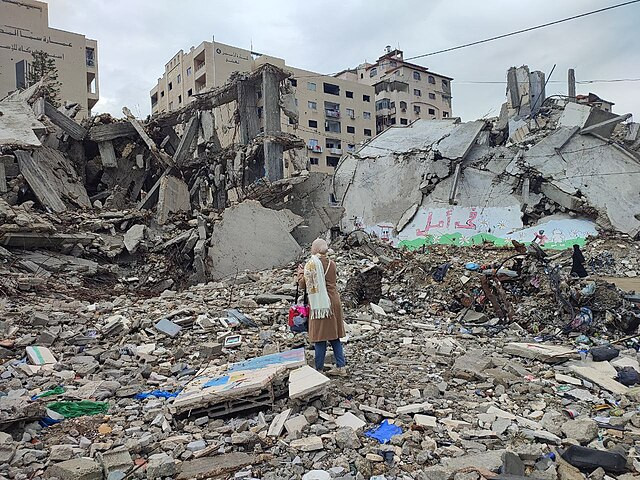Israeli airstrikes killed at least 404 Palestinians across the Gaza Strip on Tuesday, shattering a fragile ceasefire with Hamas and plunging the region back into intense conflict. Gaza's Health Ministry reported hundreds of casualties, including women and children, as Israeli Prime Minister Benjamin Netanyahu ordered a new wave of attacks following failed negotiations over the fate of hostages and the ceasefire's next phase.
The strikes, which Israeli officials described as "extensive," targeted areas across northern, central, and southern Gaza. The Israeli military also ordered evacuations from eastern Gaza, signaling potential ground operations to follow. Netanyahu's office stated: "Israel will, from now on, act against Hamas with increasing military strength."
The renewed offensive came after Hamas rejected Israel's demands to alter the terms of the ceasefire agreement. Netanyahu, facing mounting domestic pressure and mass protests over his handling of the hostage crisis and broader war strategy, said Hamas had "repeatedly refused to release our hostages and rejected all offers it received from the U.S. presidential envoy, Steve Witkoff, and from the mediators."
The airstrikes occurred during the Muslim holy month of Ramadan, exacerbating an already dire humanitarian situation in Gaza. The Hamas-run Health Ministry said more than 560 people were wounded in the bombardment, revising its confirmed toll after initially reporting higher figures. The strikes included an attack in Rafah that killed 17 members of a single family, including five children, according to the European Hospital.
The White House indicated it had been consulted ahead of the operation and voiced support for Israel. National Security Council spokesman Brian Hughes said, "Hamas could have released hostages to extend the ceasefire but instead chose refusal and war." Hamas officials, however, accused Netanyahu of launching the offensive to bolster his far-right governing coalition and labeled the operation a "death sentence" for the remaining Israeli hostages held in Gaza.
A senior Hamas official, Izzat al-Risheq, called on mediators to "reveal facts" about which side broke the truce. Hamas said four of its senior officials were killed in the strikes but did not immediately respond militarily, suggesting interest in restoring the ceasefire.
Netanyahu's decision to return to large-scale conflict has sparked anger within Israel. The Hostages and Missing Families Forum, representing relatives of Israeli captives, issued a statement condemning the move: "The Israeli government chose to give up the hostages. We are shocked, angry, and terrified by the deliberate dismantling of the process to return our loved ones."
Talks on the second phase of the ceasefire had stalled in recent weeks. The initial agreement, reached in January, led to Hamas releasing 25 Israeli hostages and the bodies of eight more in exchange for nearly 2,000 Palestinian prisoners. However, negotiations over the remaining 59 hostages, of whom 35 are believed dead, broke down. Hamas demanded an end to the war and Israeli troop withdrawal, while Israel insisted on dismantling Hamas' military capabilities before halting its operations.
In recent weeks, Israeli forces blocked all food, fuel, and aid shipments into Gaza in an effort to pressure Hamas to accept an alternative proposal. Many Palestinians anticipated renewed conflict after ceasefire talks failed to progress. "Nobody wants to fight," Gaza resident Nidal Alzaanin told the Associated Press. "Everyone is still suffering from the previous months."
The Gaza conflict has already killed over 48,000 Palestinians, according to health officials, and displaced roughly 90% of the population. Most of Gaza's population remains without access to adequate food, medical care, or shelter.
Meanwhile, international and domestic criticism of Netanyahu continues to intensify. Tens of thousands of Israelis have participated in mass demonstrations demanding a ceasefire and the return of hostages. Further protests are planned after Netanyahu's decision to dismiss the head of Israel's internal security agency, a move widely seen as an attempt to deflect blame.
The escalation underscores the complex political dynamics at play. Netanyahu's far-right coalition partners favor continued military action and have called for the depopulation of Gaza to allow the rebuilding of Israeli settlements, a position opposed by international mediators including the U.S., Egypt, and Qatar.
Hamas claims Israel's actions violated the ceasefire terms and blamed the United States for supporting the offensive. The U.S. "bears full responsibility," Hamas stated, accusing Washington of endorsing Israel's decision to resume attacks despite ongoing humanitarian concerns.
The renewed violence casts further doubt on the fate of remaining hostages, including 21-year-old Edan Alexander, the last known living U.S. citizen held in Gaza. Alexander, an Israeli-American soldier, was captured during Hamas' October 7, 2023, assault that killed 1,200 Israelis and sparked the war. His family had expressed hope he would be released under the previous ceasefire terms.




